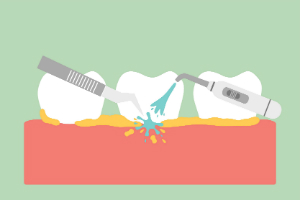
We’re Not Talking About Math!
Dental Calculus Is Damaging To Teeth.
Dental calculus is simply another name for tartar—a solid, harmful substance that builds up on teeth. Without removing this hardened plaque, teeth become more susceptible to cavities and tooth decay. Additionally, calculus along the gum line will contribute to periodontal disease, which in turn causes gum recession and eventually, tooth loss.
How Does It Form?
Our mouths are full of bacteria. All the foods we eat, the bacteria eat as well, and they especially thrive on sugar. As they break down sugar, it creates a sticky substance that coats the teeth, called plaque.
Without proper brushing, as well as regular preventative cleaning appointments, this plaque eventually hardens into a calcified material called tartar or calculus.
How Is Calculus Treated?
Once it has formed, it won’t get better on its own. The only way to get rid of it is by physically removing it from teeth surfaces. Furthermore, only a dentist can perform this process, and only by using specialized instruments. In a treatment called scaling and root planing, teeth receive a “deep cleaning,” to eliminate the problem. Tartar is scraped away, and root surfaces are smoothed.
After you’ve received treatment, it’s important to maintain the health of your teeth. They are still susceptible to future buildup, so be sure to make regular appointments for dental checkups. There, we can access the ongoing progress of your dental health, as well as provide recommendations. Take the first step by calling us today at (408) 532-0435.

